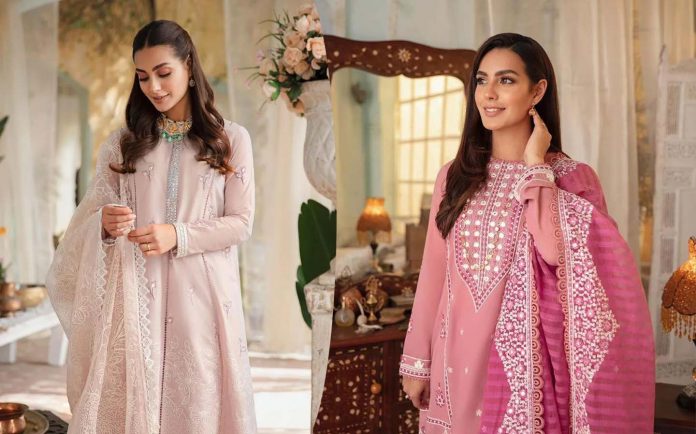Despite her success in the entertainment world in the last several years, Iqra Aziz has no intention of slowing down any time soon. Her son, Yasir, with husband and fellow actor Yasir Hussain, sat down with the Suno Chanda actress recently for an interview with a local newspaper, where she discussed how motherhood has affected her profession and how she feels it’s vital for her kid to see his mother as an independent woman. Iqra also spoke about her youth in Saddar, where she grew up in a close-knit neighborhood, and the difficulties she had growing up with the weight of her father’s death.
Iqra said that she was one of the fortunate ones who breezed through the nine months of pregnancy. Speaking about her dread of parenting, the actress said, “I wasn’t really terrified. As far as the fear is concerned. For as long as I can remember, I’ve always wanted to be married and have a family. Since I was a child, I have always had a soft spot for children. With them, I’d constantly have to babysit for other people’s children. Since Kabir was running a bit late, [Yasir and I] were left to wait.
She emphasized the need of being pragmatic in her discussion about being a working mother. Iqra described herself as a “very sensible person” while discussing the difficult decisions she’s had to make to guarantee her son’s well-being. My emotional side is in check since I’ve hardened my heart. As a parent, you want to hold your kid close and snuggle them at all times. My room has a cot for Kabir. I’m tempted to hold him close to my chest as I go off to sleep, but I restrain myself. “I believe that he should be able to sleep in his own bed.”
Iqra elaborated on how society may criticize her choices, stating, “People will definitely wonder what type of mother I am. Judgments are being thrown around a lot… Every aspect of my child’s life must revolve around the demands of my schedule.
The Ranjha Ranjha Kardi actor said, “I am privileged to have a mother who reminds me that I don’t need to feel guilty. When you leave your child alone while you go to work, you’re bound to feel some kind of mommy guilt. Kabir was just a month old when I began working. She assured me that this is the profession I’ve fought so hard for, and that she’s there to assist me in any way she can. Your kid will get an understanding of what it means to be self-sufficient. As a role model, you’ve done a wonderful job.”
When asked whether being a mother has changed her job choices, Iqra emphasized how her personal and professional lives reside in different spheres. It was as if she was stating the obvious: “My personal life, whether it’s my spouse or my kid, does not interfere with my profession.” They have no bearing on my acting persona. My life does not revolve around it at all. Choosing screenplays based on whether or not they convey a message that improves the lives of the audience is a primary consideration in my decision-making process. They need to be well-rounded individuals.
Her mental health issues and the strength and clarity achieved via treatment were also discussed in Iqra’s discussion on strength. When the performer spoke about her traumatic background, she said that she began counseling at the age of 14, which led to her mind expanding in ways she had never anticipated. It was due of her difficult upbringing that she sought treatment. When my father returned to Karachi from Saudi Arabia, I was only three years old. I’d never heard of him. At one time I thought my taya was my biological father. I had a hard time trusting him when he returned. He was very severe, but I only had nine years with him, so there was nothing I could do. When he died, I was only 12. When I was 14 or 15 years old, I first went to see a therapist.”
Her ability to explore the city freely as a child in Saddar has served her well in both her personal and professional life, according to the actor. Since the streets of Ramazan are so crowded, she said, “I grew up playing on rides in the street since it was so crowded. My mother and grandparents had also spent their whole lives in the neighborhood. More than three decades passed before we left. We were well-known in the community… I’m really glad I got to experience it. I’ve been through it myself. The ability to navigate the streets and interact with people are two of my strongest suit. When I’m in the middle of a mob, I know exactly how to act.”
She said, “Being shy is another thing, but when [I’m] given the platform to say anything, I am anxious but I can do it. I am able to speak.” It boosts my self-esteem.”
The one and only time Iqra felt self-conscious in front of the camera was the first and only time she had felt that way. A stop-motion commercial was the first commercial the Qurban actor ever performed, and he said, “My sister went with me.” I was the only one in the room, so I had to improvise facial expressions for the camera… I began weeping because I realized that there were a lot of people around me and that they were all going to be looking at me. After all, I was only 14-years-old at the time. I followed her advice and kept going. “After then, there was no going back,” he said.
